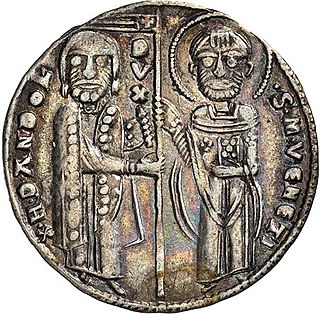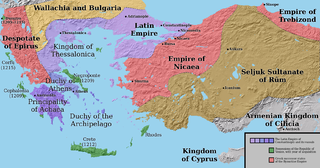Related Research Articles

The Doge of Venice was the highest role of authority within the Republic of Venice. The word Doge derives from the Latin Dux, meaning "leader," originally referring to any military leader, becoming in the Late Roman Empire the title for a leader of an expeditionary force formed by detachments from the frontier army, separate from, but subject to, the governor of a province, authorized to conduct operations beyond provincial boundaries.

Enrico Dandolo was the doge of Venice from 1192 until his death. He is remembered for his avowed piety, longevity, and shrewdness, and his role in the Fourth Crusade and the Sack of Constantinople. Dandolo died in 1205 in Constantinople and was buried at the Hagia Sophia.

Jacopo Tiepolo, also known as Giacomo Tiepolo, was Doge of Venice from 1229 to 1249. He had previously served as the first Venetian Duke of Crete, and two terms as Podestà of Constantinople, twice as governor of Treviso, and three times as ambassador to the Holy See. His dogate was marked by major domestic reforms, including the codification of civil law and the establishment of the Venetian Senate, but also against a mounting conflict with Emperor Frederick II, which broke into open war from 1237 to 1245.

The Partitio terrarum imperii Romaniae, or Partitio regni Graeci, was a treaty signed among the crusaders after the sack of the Byzantine capital, Constantinople, by the Fourth Crusade in 1204. It established the Latin Empire and arranged the nominal partition of the Byzantine territory among the participants of the Crusade, with the Republic of Venice being the greatest titular beneficiary. However, because the crusaders did not in fact control most of the Empire, local Byzantine Greek nobles established a number of Byzantine successor kingdoms. As a result, much of the crusaders' declared division of the Empire amongst themselves could never be implemented. The Latin Empire established by the treaty would last until 1261, when the Empire of Nicaea reconquered Constantinople, re-establishing the Byzantine Empire. The various crusader principalities in southern Greece and the Aegean archipelago would last much longer, until they were conquered by the Ottomans in the 14th and 15th centuries.
The Podestà of Constantinople was the official in charge of Venetian possessions in the Latin Empire and the Venetian quarter of Constantinople during the 13th century. Nominally a vassal to the Latin Emperor, the Podestà functioned as a ruler in his own right, and answered to the Doge of Venice. The Podestà was also officially known as Governor of One-Fourth and One-Half of the Empire of Romania and was entitled to wearing the crimson buskins as the emperors.
Marco Gradenigo was a 13th-century Venetian nobleman, senior provincial administrator in the Venetian overseas empire and a military commander. He was involved in three major conflicts: the War of the Euboeote Succession, where Gradenigo organized a league of the lords of Latin Greece against the Principality of Achaea; the defence of the Latin Empire against the Empire of Nicaea, which failed with the Reconquest of Constantinople by the Nicaeans during Gradenigo's tenure as Podestà of Constantinople; and the naval operations of the War of Saint Sabas against the Republic of Genoa.
Jacopo Dolfin or Giacomo Dolfin was a 13th-century Venetian nobleman and senior provincial administrator in the Venetian overseas empire.
Pietro Foscarini was a 13th-century Venetian nobleman and administrator.
Marco Gausoni was a 13th-century Venetian nobleman, military commander, and administrator.
Egidio Querini was a 13th-century Venetian nobleman, ambassador, and administrator.
Giacomo Baseggio was a 13th-century Venetian nobleman and administrator.
Giovanni Michiel was a 13th-century Venetian nobleman, merchant, and administrator.
Albertino Morosini was a 13th-century Venetian nobleman and administrator.
Teofilo Zeno was a 13th-century Venetian nobleman and administrator.
Romeo Querini was a 13th-century Venetian nobleman and administrator.
Giovanni Querini was a 13th-century Venetian nobleman and administrator.
Marino Storlato was a Venetian nobleman and administrator.
Marino Michiel was a Venetian nobleman and administrator.
Marino Dandolo was a Venetian nobleman and administrator.
Marino Zeno was a Venetian nobleman and administrator.
References
- 1 2 3 4 5 6 Jacoby 2006, p. 67.
- ↑ Jacoby 2006, pp. 67–68.